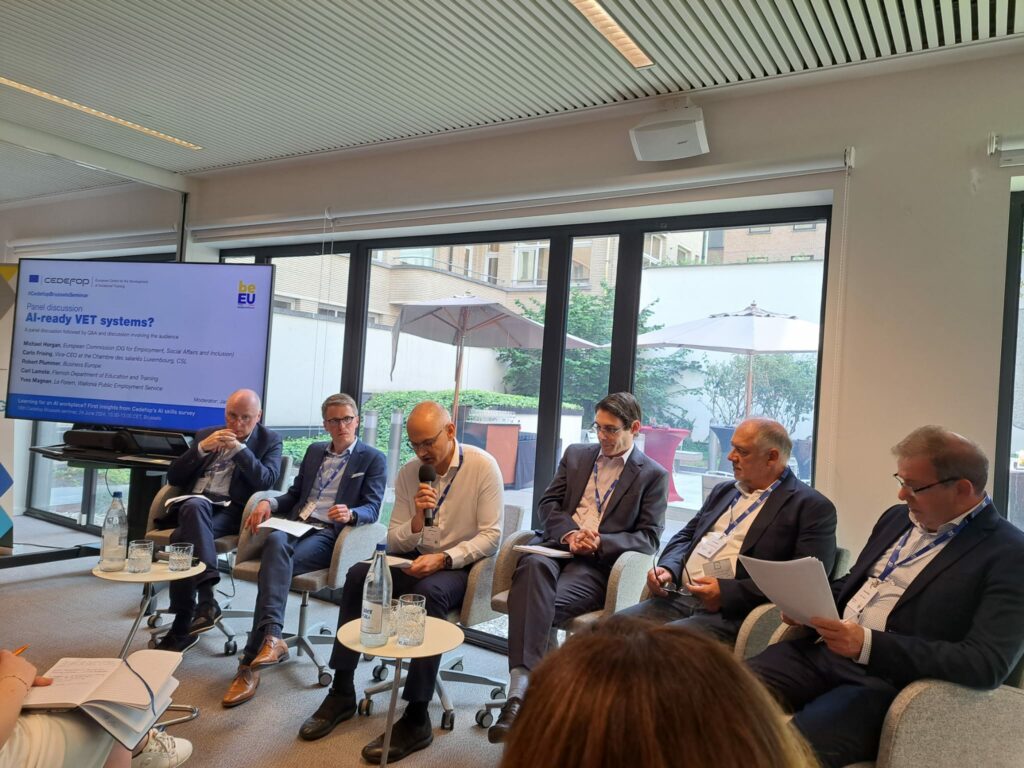Learning for an AI workplace? First insights from Cedefop’s AI skills survey in Brussels
25/06/2024

EARLALL participated at Cedefop’s 16th Brussels seminar “Learning for an AI workplace? First insights from Cedefop’s AI skills survey”, organised in cooperation with the Belgian Presidency of the Council of the EU on 24 June 2024.
The seminar gathered around 80 Brussels stakeholders from the EU institutions, Belgian organisations and education and employment European associations at the Permanent Representation of Belgium to the EU. The conference started with opening remarks by Jeroen Backs, Head of Strategy & Knowledge Division, Department of Education and Training Flanders, Belgium and Jasper Van Loo, on behalf of Cedefop.
The seminar addressed the main skill challenges associated with the transition towards human-centric EU workplaces as opposed to one governed mainly by artificial intelligence (AI) technologies. The first panel on ‘AI in European workplaces’ included presentations from Konstantinos Pouliakas, Cedefop and Nicolas Becuwe, Verian who introduced the first Cedefop AI skills survey carried out in spring 2024. The survey provides robust insights into AI skill demands in European labour markets, the extent to which European companies adopt labour-friendly management practices and how AI-ready the skills of European workers are. The survey will be revised in the next months to add data from more countries and responses.
Improving AI Competence
The results of the survey reveal the need to improve ‘AI competence levels’, include AI in education curricula, cooperate with companies and organisations and to improve training and upskilling and avoid gender imbalance, for example. The panel concluded with the intervention of Anoush Margaryan, Copenhagen Business School, who highlighted the human capabilities in the age of AI and learning machines in line with her research and stressed the fact that machines are not able to learn. Prof Margaryan concluded by saying that it is important to avoid misappropriation of terms that might mislead people to believe what machines can and can not do; the sensationalist use of terminology promotes enchantment and can also create anxiety and alter people’s perceptions.
The second panel was devoted to ‘Learning for AI’ and explored if skills gaps are prevalent and if upskilling or reskilling investments are in place. The way AI can inform education systems was also analysed. Investing in the skills of an AI-ready workforce was presented by Giulia Santangelo, Cedefop, who mentioned that from 2014 to 2020 the percentage from European Structural and Investment (ESIF) funds that were allocated to AI-related issues went from zero to 14% in some countries.
Sectoral and regional focus on AI
According to CEDEFOP, the three main sectors absorbing AI are 1. Manufacturing; 2. Information and Communication and 3. Professionals, scientific and technology. Seamus McGuinness, from ESRI and partner in the TRAILS Horizon Europe project, presented a research paper which provides data on ‘Automation and upskilling of European workers’.
In addition, the project Digisprong from Flanders was presented by Katrina Alen, Flemish Department of Education & Training. The project, carried out in two phases (consultation and writing guidelines/requirements) aims at using AI for education purposes by highlighting 7 basic requirements for responsible AI in education which doesn’t create disadvantages. The 7 requirements are: 1. The learner is paramount in the learning process (from a pedagogical, didactical and socio-emotional perspective); 2. AI is not an end in itself; 3. AI applications are trustworthy (EU requirements apply); 4. AI applications should be based on shared values; 5. Responsible AI is a continuous proof; 6. Education has a support network that is AI-ready and AI resilient; 7. Professional and responsible AI go hand in hand. The Flemish Department of Education and Training is now translating those principles into actions.
Training and education for AI skills
The conference concluded with a panel discussion on AI-ready VET systems, with representatives from the two Belgian regions (Carl Lamote, Flemish Department of Education and Training and Yves Magnan, Le Forem, Wallonia Public Employment Service), Cedefop (Jasper van Loo), the European Commission (Michael Horgan) and social partners (Robert Plummer – Business Europe and Carlo Frising – Chambre des salaries Luxembourg). They draw some takeaways such as the need to identify skills gaps and improve training provision for AI; analyse the differences among European countries to avoid disparities in performance; more human-centred and responsible approaches to policies and measures to promote ethics and fair implementation of AI; promote peer learning and cooperation among stakeholders; increase funding and continue reflecting about the implications of AI for workers and productivity.
The event material is available here: Learning for an AI workplace? First insights from Cedefop’s AI skills survey | CEDEFOP (europa.eu)




